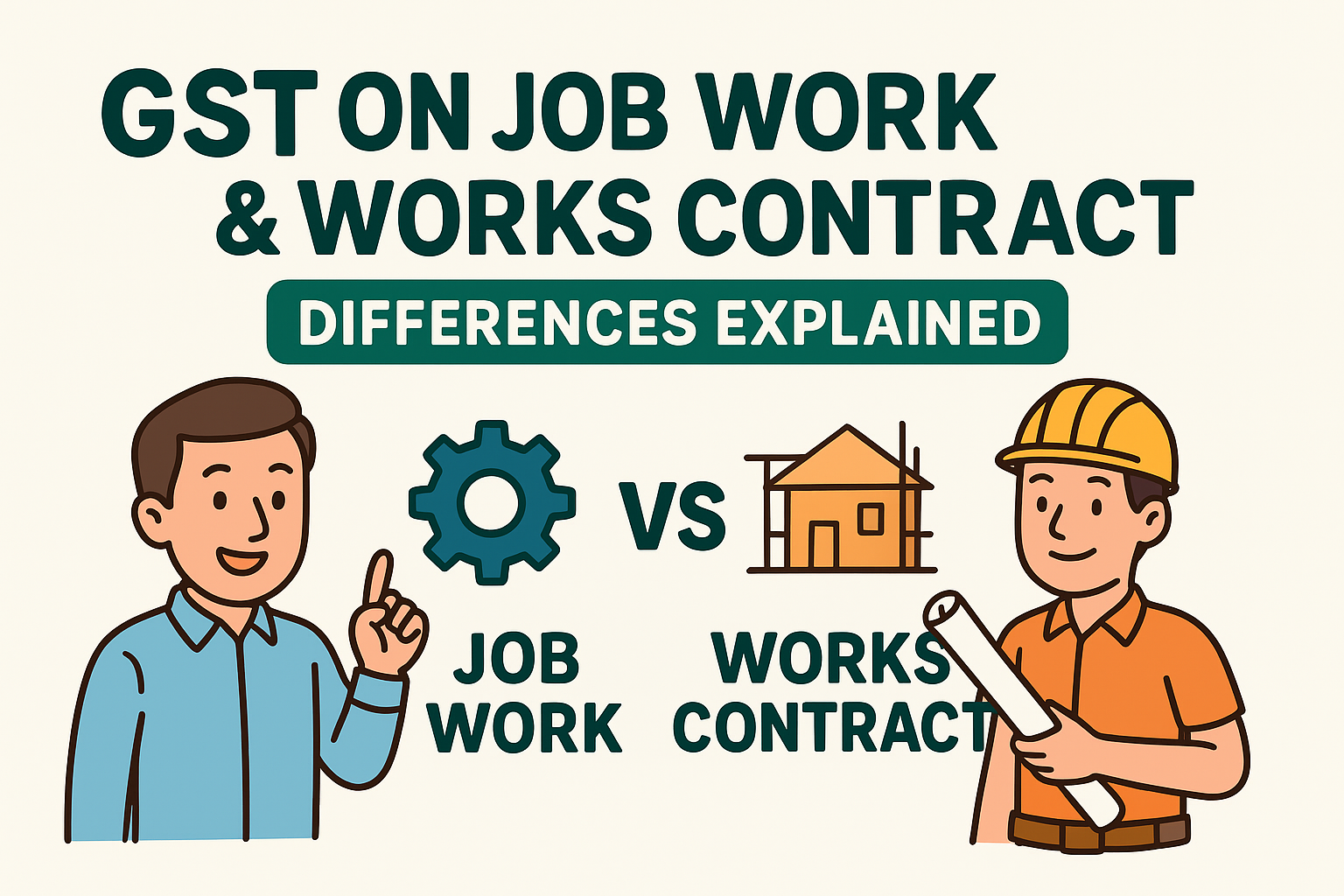In GST law, Job Work and Works Contract are two commonly used terms, but most taxpayers and businesses get confused between the two. While both involve work being done on goods or services, the tax treatment under GST is very different.
In this blog, we will explain GST on Job Work vs Works Contract, their meaning, GST rate, exemptions, compliance, and most importantly, the key differences.
Table of Contents
1. What is Job Work under GST?
- Job work means processing or working on goods belonging to another registered person.
- Ownership of goods remains with the principal, not with the job worker.
- The job worker only performs work such as manufacturing, alteration, repair, polishing, or finishing.
Example:
A garment manufacturer sends cloth to a tailor for stitching shirts. The cloth belongs to the manufacturer, but the tailor charges for stitching. This is job work.
Relevant GST Section:
- Section 2(68) of the CGST Act, 2017 defines job work.
- Section 143 deals with procedure related to job work.
GST Rate on Job Work:
- For most manufacturing processes: 12%
- For job work in textile, printing, diamond, and certain industries: 5%
- If it is purely a service (not notified under job work): 18%
2. What is Works Contract under GST?
- Works contract means a contract for construction, building, repairing, installation, or commissioning of an immovable property.
- Here, both goods and services are supplied together.
- Ownership of material and property remains with the customer after construction.
Example:
A builder constructs an office building using cement, steel, and labor. He supplies both materials and services together. This is a works contract.
Relevant GST Section:
- Section 2(119) of CGST Act, 2017 defines works contract.
- It is always treated as supply of service under GST.
GST Rate on Works Contract:
- Generally 18%
- For affordable housing, government projects, and specific schemes: 12%
3. Key Differences between Job Work and Works Contract
| Basis | Job Work | Works Contract |
|---|---|---|
| Definition | Processing of goods belonging to another person. | Contract for construction, installation, repair of immovable property. |
| Ownership of Goods | Remains with the principal (owner of goods). | Ownership of property remains with customer. |
| Nature | Mainly related to movable goods. | Always related to immovable property. |
| GST Classification | Can be goods or services (depends on nature). | Always treated as service. |
| GST Rate | 5% / 12% / 18% depending on industry. | 12% or 18% depending on project type. |
| Relevant Section | Section 2(68) & Section 143. | Section 2(119). |
| Example | Tailor stitching cloth, goldsmith making ornaments, auto-parts painting. | Builder constructing house, contractor installing lift, plumber fixing pipelines. |
4. Input Tax Credit (ITC) – Difference
- Job Work:
- Principal can send goods to job worker without paying GST (under challan).
- ITC is available to the principal for inputs used.
- Finished goods must be returned within 1 year (for inputs) or 3 years (for capital goods).
- Works Contract:
- ITC is restricted.
- ITC not allowed if works contract is for construction of own property.
- ITC allowed only if used for further supply of works contract services.
5. Practical Examples
- Job Work:
- A jewelry manufacturer gives raw gold to a goldsmith for making bangles. GST applies on job worker’s charges (e.g., making charges).
- A car company sends auto parts to a painter for coating.
- Works Contract:
- A builder constructs a mall with cement and steel. GST @18% on total contract.
- A contractor installs elevators in an office building.
6. Common Confusions
- Repair of Machinery – If machine parts are replaced (immovable plant installation), it may become a works contract. But if it is repair of a movable machine, it is job work.
- Fabrication Work – If fabrication is on goods (movable), it is job work. If fabrication becomes part of immovable property, it is works contract.
- AMC Contracts – Annual maintenance contracts are usually treated as composite supply, where works contract may apply if immovable property is involved.
7. Compliance of GST on Job Work & Work Contract
- For Job Work:
- Goods must be sent under GST challan.
- E-way bill required if value exceeds limit.
- Return goods within prescribed time (1 year/3 years).
- For Works Contract:
- Always issue tax invoice.
- GST @ 18% unless exempt.
- RCM (Reverse Charge) may apply in government contracts in some cases.
8. Conclusion
While Job Work and Works Contract may sound similar, they are treated very differently under GST.
- Job Work is related to movable goods, with flexible GST rates (5%/12%/18%).
- Works Contract is related to immovable property, always treated as a service at 18% (or 12% in some projects).
- ITC rules are also stricter in works contracts as compared to job work.
Understanding the clear difference between the two helps businesses avoid wrong GST classification, notices, and penalties. Contact taxgiveindia.com for paid gst related services.
9. FAQs on GST on Job Work & Works Contract
Q1. Is job work exempt from GST?
No, job work is taxable, but concessional rates (5%/12%) are available in specific industries.
Q2. Can ITC be claimed on works contract services?
Only if the recipient is in the same line of business and uses it for further supply of works contract services. Otherwise, ITC is blocked.
Q3. Is works contract always a service under GST?
Yes, as per Section 2(119), works contract is always treated as supply of service.
Q4. Can goods be sent to job worker without GST?
Yes, principal can send goods without GST under challan, but they must be returned within time limit.
